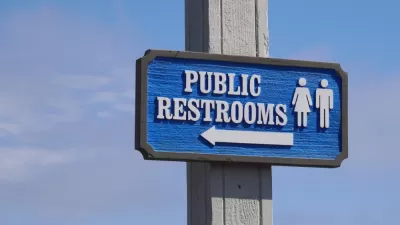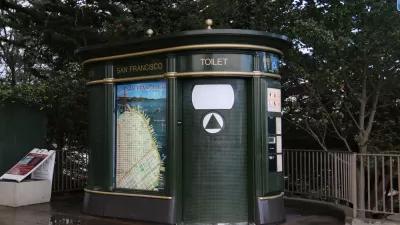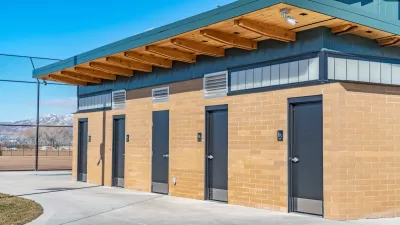Critics question why a single-toilet public bathroom could cost the city close to $2 million and take two years to build.

A San Francisco plan to build a public restroom is being met with backlash and derision, reports Nathan Solis for the Los Angeles Times. Not because it’s not needed—but because the single-toilet restroom in question is projected to cost $1.7 million and take two years to build.
While the San Francisco Recreation and Parks Department says the estimated cost is “more nuanced and less sensational” than people think and that the project could come in at a much lower cost, critics call the cost and timeline “insane.”
According to a statement by the parks department, the agency will consider several options, including a pre-fabricated bathroom. “In the end, the project may well be delivered for far less, with leftover funding put toward further improvements or maintenance,” the statement said. However, city officials also worry that equipment requirements by the region’s utility company, Pacific Gas & Electric (PG&E), could drive up costs. As the article explains, “San Francisco’s public utility owns a power supply system that is then sold to its customers, but the power lines are owned and maintained by PG&E.”
Elsewhere in the city, the Pit Stop program, which provides public toilets and other services, has helped reduce 311 calls related to human waste in the Tenderloin neighborhood.
FULL STORY: San Francisco plans to spend 2 years, $1.7 million to build single-toilet public restroom

Maui's Vacation Rental Debate Turns Ugly
Verbal attacks, misinformation campaigns and fistfights plague a high-stakes debate to convert thousands of vacation rentals into long-term housing.

Planetizen Federal Action Tracker
A weekly monitor of how Trump’s orders and actions are impacting planners and planning in America.

In Urban Planning, AI Prompting Could be the New Design Thinking
Creativity has long been key to great urban design. What if we see AI as our new creative partner?

King County Supportive Housing Program Offers Hope for Unhoused Residents
The county is taking a ‘Housing First’ approach that prioritizes getting people into housing, then offering wraparound supportive services.

Researchers Use AI to Get Clearer Picture of US Housing
Analysts are using artificial intelligence to supercharge their research by allowing them to comb through data faster. Though these AI tools can be error prone, they save time and housing researchers are optimistic about the future.

Making Shared Micromobility More Inclusive
Cities and shared mobility system operators can do more to include people with disabilities in planning and operations, per a new report.
Urban Design for Planners 1: Software Tools
This six-course series explores essential urban design concepts using open source software and equips planners with the tools they need to participate fully in the urban design process.
Planning for Universal Design
Learn the tools for implementing Universal Design in planning regulations.
planning NEXT
Appalachian Highlands Housing Partners
Mpact (founded as Rail~Volution)
City of Camden Redevelopment Agency
City of Astoria
City of Portland
City of Laramie





























